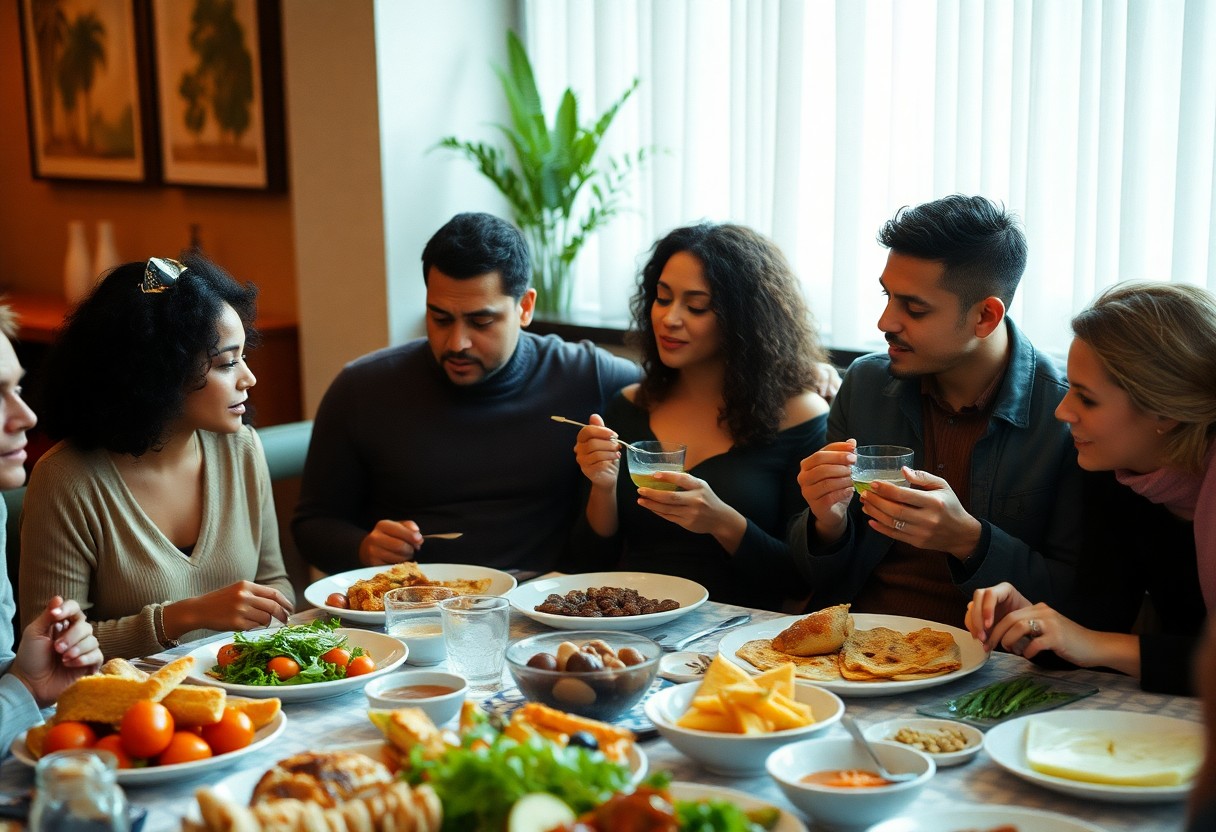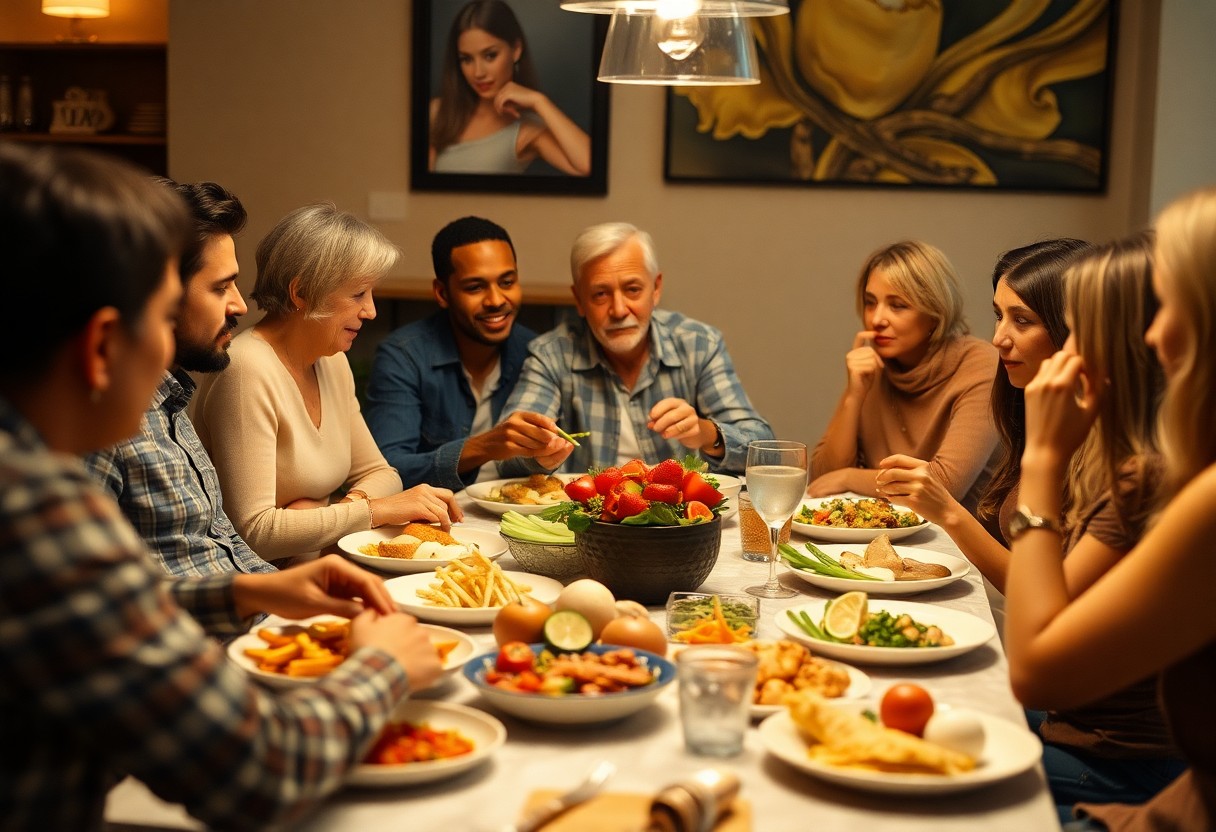Eating can often be influenced by your emotions. Whether you feel happy, sad, or stressed, your mood can affect what and how much you eat. This connection might lead to comfort eating or skipping meals. By understanding this link, you can make better choices about your eating habits. In this blog post, you will explore how emotions impact your food choices and learn practical tips to manage emotional eating effectively.
Key Takeaways:
- Emotions play a significant role in our eating habits. Stress, sadness, and even happiness can influence what and how much we eat.
- Being aware of your emotions can help you make healthier food choices. Instead of reaching for snacks when feeling sad, try other activities like walking or talking to a friend.
- Keeping a food journal can help you track your eating patterns and the emotions connected to those choices. This awareness can lead to better decisions regarding food and overall well-being.

The Science of Emotions
The study of emotions is a fascinating area of psychology. Emotions are complex reactions your brain has in response to certain stimuli. They involve physical sensations, thoughts, and behaviors. Understanding how emotions work can help you manage them better, especially when it comes to your eating habits.
What Are Emotions?
Across various situations, emotions are your responses to events, people, or thoughts. They can be positive, like joy and love, or negative, such as anger and sadness. Each emotion serves a purpose and influences how you think and react in daily life.
How Emotions Affect the Brain
Across the brain, emotions play a key role in decision-making and behavior. Different areas of the brain respond to different feelings. For instance, the amygdala processes fear while the prefrontal cortex helps with your decision-making. This connection between your emotions and brain activity can significantly impact how and when you eat.
Indeed, your emotions can trigger powerful responses in your brain that affect your eating patterns. When you feel stressed or anxious, your brain sends signals that may lead you to crave comfort foods. Conversely, feelings of happiness might encourage you to make healthier choices. Understanding this connection helps you recognize emotional eating patterns and make better food choices.

Emotional Eating Defined
Now, emotional eating is when you eat not because you’re hungry, but due to your feelings. It often happens in response to stress, sadness, or boredom. Instead of focusing on calories and nutrition, you might turn to food for comfort or a way to cope. This behavior can lead to overeating and unhealthy eating habits.
Understanding Emotional Eating
Across many studies, emotional eating has been linked to how you manage your emotions. It’s not uncommon to find yourself reaching for snacks when you’re feeling stressed or anxious. Understanding this connection helps you become aware of your eating triggers, allowing you to make healthier choices instead of turning to food.
Triggers of Emotional Eating
One of the main triggers of emotional eating is your emotional state, which may be influenced by daily life stressors. You might eat more when you feel overwhelmed, bored, or even happy. Identifying these feelings is the first step towards changing your eating habits.
Triggers often stem from various sources, including stress from school, relationships, or work. You might also feel tempted to eat due to boredom or sadness. Social gatherings can spark emotional eating as well, especially when surrounded by tempting snacks. Understanding your personal triggers can help you resist turning to food during emotional moments, making it easier to choose healthier options instead.
The Role of Stress
For many people, stress plays a significant role in their eating habits. When faced with stressful situations, your body reacts in ways that can increase your desire to eat. This is often due to the release of hormones that affect your feelings and appetite. Stress can also lead to emotional eating, where you turn to food for comfort rather than hunger. Understanding this link can help you manage your eating habits more effectively.
Stress and Food Cravings
Food cravings often intensify when you are under stress. You may find yourself reaching for sugary snacks or high-fat foods, seeking immediate comfort. This reaction is not just about hunger; it’s about how your emotions influence your choices. Stress triggers the brain’s reward system, making these types of foods more appealing. Being aware of this can help you make better decisions and choose healthier options during stressful times.
Coping Mechanisms through Food
Across different situations, you may use food as a way to cope with stress and anxiety. Eating can offer a temporary sense of relief, providing a momentary escape from your worries. However, this can lead to unhealthy habits if done frequently. Instead of relying solely on food, it can be beneficial to explore other coping strategies that promote emotional wellness.
Considering various coping mechanisms can lead you to healthier choices. Instead of eating when stressed, you might find that physical activity, talking to a friend, or practicing mindfulness can be effective alternatives. By actively seeking these alternatives, you reduce the urge to use food as a stress reliever. This shift can improve your overall health and enhance your emotional well-being.
The Influence of Environment
Not all eating experiences are the same. Your environment plays a big role in how you feel and what you choose to eat. Factors like lighting, noise, and the presence of others can impact your emotions and decisions at mealtime. For example, a cozy setting can make you feel relaxed and content, often leading you to enjoy your meals more. In contrast, a noisy or chaotic environment might lead to stress, which can cause you to eat mindlessly or overeat. Paying attention to your surroundings can help you make healthier choices.
Social Situations and Eating
Between celebrations and gatherings, social situations often affect your eating habits. When you’re surrounded by friends and family, you might be inclined to indulge in more food than usual, especially when it comes to shared treats. This can create a sense of bonding, but it might also lead to overindulgence. Understanding how these social interactions influence your eating can help you find a balance that maintains your health without sacrificing fun.
Food Marketing and Emotions
Against the backdrop of clever advertising and promotions, food marketing significantly shapes your emotions and food choices. Companies use bright colors, attractive packaging, and emotional messages to grab your attention. These strategies can create cravings and link certain foods with feelings of happiness or nostalgia. You might find yourself drawn to certain snacks simply because of the emotions they evoke, even if they don’t align with your health goals.
Due to savvy marketing techniques, many foods are marketed in ways that tap into your feelings. This can lead you to associate certain products with happiness or comfort, nudging you to reach for them in times of stress or celebration. For example, ads often show people enjoying ice cream at family gatherings or fast food during fun events. This connection can make it hard for you to resist these foods. Staying conscious of these tactics can help you make more mindful choices that support your well-being.
Strategies to Manage Emotional Eating
Once again, understanding your emotions can help you manage emotional eating. You can explore different strategies to create healthier habits. Techniques like mindfulness can help you become more aware of your feelings and eating patterns. For more on this topic, see Understanding the Relationship Between Food and Emotions.
Mindfulness Techniques
Techniques such as meditation and deep breathing can ground you when you feel the urge to eat emotionally. By taking a moment to focus on your breath, you can check in with your feelings. This awareness can lead you to make better choices about when and what to eat.
Healthy Alternatives
On your journey to better eating habits, consider healthier snack options. Instead of turning to sugary treats when you’re stressed, choose fruits, veggies, or nuts. This way, you nourish your body without giving in to unhealthy cravings.
Manage your emotional eating by planning ahead. Stock your pantry with healthy foods that you enjoy. When you’re feeling emotional, having these options ready can help you avoid unhealthy impulses. Keep a journal of your feelings and food choices; this can help you notice patterns and find alternatives that satisfy you in a healthier way.

Building a Healthy Relationship with Food
Unlike many people think, food is not just fuel for your body. It’s also a powerful part of your emotional life. When you build a healthy relationship with food, you learn to enjoy eating without guilt. This means understanding your feelings around food and knowing how to appreciate meals. You can still indulge in your favorite snacks while maintaining balance. The goal is to make food a source of joy and nourishment instead of stress.
Recognizing Emotional Hunger
Before you reach for a snack, take a moment to assess your feelings. Emotional hunger often feels different than physical hunger. You might crave specific foods when you’re sad, bored, or anxious. By understanding when you are eating out of emotion, you empower yourself to make better choices. Ask yourself if you are truly hungry or if there is an emotion driving your appetite.
Learning to Listen to Your Body
Food can serve as a guide to how your body feels and what it needs. A good way to learn about your body is to pay attention to hunger cues. Start by asking yourself if you’re genuinely hungry or just eating out of habit or emotion. You can practice mindful eating by slowing down and savoring each bite. This helps you notice when you’re full and appreciate the flavors of your meals. By listening to your body, you can develop a more positive relationship with food.
Conclusion
Following this, you can better understand how your emotions influence your eating habits. Recognizing these connections allows you to make healthier choices when it comes to food. By being mindful of your feelings, you can work toward a balanced relationship with eating. Consider keeping a food diary to track your emotional triggers and meal patterns. This can help you develop awareness and improve your overall well-being.
FAQ: Understanding the Link Between Emotions and Eating
Q: What is emotional eating?
A: Emotional eating is when people eat in response to their feelings rather than hunger. This can happen when someone is sad, stressed, or even bored. Instead of eating to satisfy physical hunger, they may turn to food for comfort or distraction.
Q: How do emotions affect our food choices?
A: Emotions can strongly influence what we eat. For example, some people may crave sweets or comfort foods when they are feeling down. On the other hand, someone who is happy might choose to eat celebratory foods. Our mood can change our preferences, leading to unhealthy choices at times.
Q: Can emotional eating lead to health problems?
A: Yes, emotional eating can contribute to various health issues. Regularly eating for emotional reasons can lead to overeating and weight gain. This can also increase the risk of health problems like diabetes, heart disease, and anxiety. Healthy coping strategies are important to avoid these risks.
Q: How can I stop emotional eating?
A: Stopping emotional eating starts with awareness. Here are a few tips to help:
- Keep a food journal to track what you eat and how you feel.
- Find alternative activities when you feel the urge to eat emotionally—like going for a walk or talking to a friend.
- Practice mindful eating. Focus on your food, chewing slowly and enjoying each bite.
Q: Is it possible to eat healthily while managing emotions?
A: Yes, it is definitely possible. Balancing emotional health and healthy eating involves self-care. Try to recognize your emotional triggers and respond in healthier ways. Incorporate more fruits, vegetables, and whole grains into your meals. Eating balanced meals can boost your mood and energy levels, making it easier to manage emotions without turning to food.
Key Takeaways
Understanding the link between emotions and eating is vital for maintaining a healthy lifestyle. Emotional eating can lead to poor food choices and health problems. By being mindful of our feelings and finding healthier ways to cope, we can improve our relationship with food. Keep track of your emotions and explore alternative activities to create a balanced approach to eating.





